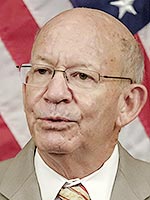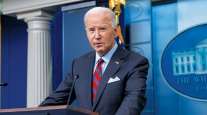Senior Reporter
Senate Transportation Leaders Applaud Water Bill’s Passage

[Stay on top of transportation news: Get TTNews in your inbox.]
Legislation meant to facilitate the flow of freight along the nation’s waterways easily passed in the Senate, garnering strong endorsements from the chamber’s transportation leaders.
By a 93-1 vote, senators recently approved the Water Resources Development Act (WRDA) of 2022. Its passage sets up legislative negotiations with House lawmakers.
Sen. Tom Carper (D-Del.), chairman of the Environment and Public Works Committee and one of the measure’s co-sponsors, pointed to its supply chain and climate change provisions. The bill focuses primarily on programs under the jurisdiction of the Army Corps of Engineers.
Enacting WRDA 2022 will keep our economy moving, restore critical ecosystems and protect communities.
Sen. Tom Carper (D-Del.)
“It’s a good day in the U.S. Senate when we pass bipartisan legislation that invests in our nation’s water infrastructure,” Carper said July 28. “In addition to supporting the Army Corps of Engineers’ civil works program, the Water Resources Development Act of 2022 also better positions the corps for the future. Enacting WRDA 2022 will keep our economy moving, restore critical ecosystems and protect communities big and small from the worsening impacts of climate change.”
Sen. Shelley Moore Capito (R-W.Va.), the EPW panel’s ranking member, added, “WRDA 2022 will help the Corps protect the lives and livelihoods of millions of Americans and facilitate commerce throughout this country and internationally. In addition to addressing needs across the United States, this legislation advances important flood control projects for West Virginia, and delivers support for water and wastewater services in the state.”

There are many reasons for trucking's ongoing labor shortage. We recap discussions from the first half of this year in this "roundabout" episode. Tune in above or by going to RoadSigns.TTNews.com.
Specifically, the Senate bill would facilitate construction of new projects for the Corps. Those projects would pertain to navigation, flood control, disaster mitigation and restoration initiatives. The bill also would authorize feasibility studies and proposed modifications to myriad projects. The Government Accountability Office would be tasked with reviewing delays associated with certain projects.
Voting in opposition of the Senate bill was Sen. Mike Braun (R-Ind.), according to the clerk of the chamber. Braun is a member of the Appropriations Committee.
The House has yet to schedule debate on the Senate-passed version of the WRDA bill. Transportation and Infrastructure Chairman Peter DeFazio (D-Ore.) said he anticipates arriving at a compromise capable of reaching President Joe Biden’s desk.

DeFazio
“This important legislation will invest in our ports, harbors, inland waterways, flood protection and other essential water infrastructure,” DeFazio said. “This legislation shares many similarities with the House-passed WRDA bill — which was approved in June on an overwhelmingly bipartisan vote — with its focus on climate, resiliency and affordability for Corps projects, as well as addressing pending Corps of Engineers’ projects and studies awaiting congressional authorization.”
In June, the House passed its WRDA version. Similar to the Senate bill, the House bill would aim to pave the way for projects on dredging, commercial navigation and flood control. Specifically, the House bill would approve dozens of projects on shoreline protection and flooding, as well as feasibility studies on reservoirs, commercial corridors and alternative sources of energy.
“Through biennial enactment, our committee has addressed local, regional and national needs through authorization of new U.S. Army Corps of Engineers projects, studies and policies that benefit every corner of the nation,” Water Resources and Environment Subcommittee Chairwoman Grace Napolitano (D-Calif.) said soon after the bill’s passage.

Graves
The House bill garnered bipartisan backing. Transportation and Infrastructure Committee ranking member Sam Graves (R-Mo) observed: “Effective ports, inland waterways and flood protection infrastructure all help to strengthen and keep our economy moving, and with the current supply chain crisis, it’s more critical than ever to support water infrastructure and protect our communities.”
Prominent stakeholders touted the Senate’s action. American Society of Civil Engineers Executive Director Tom Smith noted, “WRDA 2022 brings about several changes to existing water infrastructure policy that will benefit communities nationwide. The legislation also includes provisions to enhance the safety of the nation’s dams and levees, which each received a ‘D’ grade in the 2021 [ASCE] report card.”
Want more news? Listen to today's daily briefing below or go here for more info:





